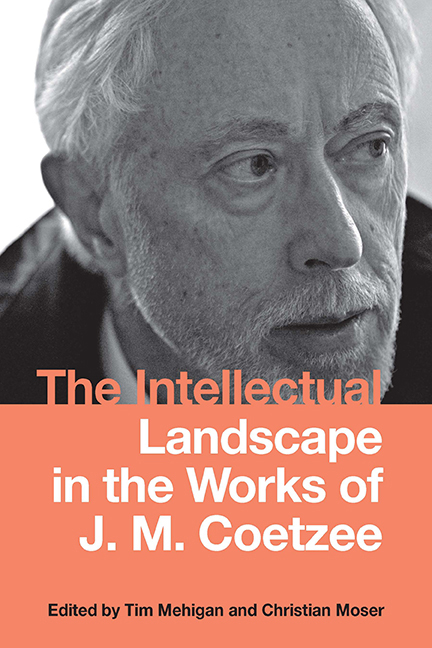Book contents
- Frontmatter
- Contents
- Acknowledgments
- Introduction: Coetzee's Intellectual Landscapes
- Part I Truth and Justification
- Part II Objectivity and Communication
- Part III Convergence of Interpretative Horizons and Moral Solidarity
- 11 Coetzee as Academic Novelist
- 12 Character and Counterfocalization: Coetzee and the Kafka Lineage
- 13 J. M. Coetzee's South African Intellectual Landscapes
- 14 Philosophical Fiction? On J. M. Coetzee's Elizabeth Costello
- 15 Cosmopolitanism, the Range of Sympathy, and Coetzee
- Notes on the Contributors
- Index
11 - Coetzee as Academic Novelist
from Part III - Convergence of Interpretative Horizons and Moral Solidarity
Published online by Cambridge University Press: 03 July 2019
- Frontmatter
- Contents
- Acknowledgments
- Introduction: Coetzee's Intellectual Landscapes
- Part I Truth and Justification
- Part II Objectivity and Communication
- Part III Convergence of Interpretative Horizons and Moral Solidarity
- 11 Coetzee as Academic Novelist
- 12 Character and Counterfocalization: Coetzee and the Kafka Lineage
- 13 J. M. Coetzee's South African Intellectual Landscapes
- 14 Philosophical Fiction? On J. M. Coetzee's Elizabeth Costello
- 15 Cosmopolitanism, the Range of Sympathy, and Coetzee
- Notes on the Contributors
- Index
Summary
BOOKS ON TOPICS LIKE Milton and Machiavelli, George Eliot and Auguste Comte, Hawthorne and New England transcendentalism fill library shelves. But it is fairly clear that intellectual history can play only a marginal role in literary criticism. After all, poems and novels do not make arguments, nor do they develop and examine concepts logically, nor do they invent or deploy analytic methods, which are the kinds of things that most texts in the intellectual historian's archive do do. This remains true, however much literary texts may be shaped by the concepts around them, however much they may adhere to idea-driven programs.
This structural disjunction between intellectual context and literary work took a new turn when, from the nineteenth century on, advanced intellectual life in the West became routinely housed in universities. After the Second World War, this process intensified as higher education was extended into populations. As a result, when intellectual histories of the postwar period come to be written, they will mainly consist of histories of academic disciplines. At the same time, the old (classically based) “liberal arts” were transformed into what we now call the “humanities,” a transdiscipline under whose shade an extra-mural reading public of university graduates took shape. This public retained some interest in professional scholarship and was able to keep abreast of it in journals like The New York Review of Books and London Review of Books, established from the sixties on. More importantly, it appreciated fictions which were themselves shaped by the academic humanities, a genre that I will call “humanities fiction.”
For literature, the academicization of knowledge marked a break in the history of taste. This rupture occurred in Cambridge in the 1920s when, in the wake of T. S. Eliot's pathbreaking literary-critical essays, a small group of professional critics (I.A. Richards, William Empson, F. R. and Q. D. Leavis) developed a mode of criticism which displaced older forms of philology, rhetoric, literary history, and upper-class belle-lettrism (i.e., the amateur, or amateur-seeming, culture of literary appreciation at that time most associated with Bloomsbury). Its primary method, “close reading,” would form the basis of almost all subsequent academic literary pedagogy, if not of scholarship. By the 1970s, when enrollments in English as a proportion of total undergraduate enrollments peaked, a number of factions had appeared within the discipline, each with their own theoretical formulation, method, and (implicitly) cultural-political orientation.
- Type
- Chapter
- Information
- The Intellectual Landscape in the Works of J. M. Coetzee , pp. 233 - 253Publisher: Boydell & BrewerPrint publication year: 2018
- 2
- Cited by



